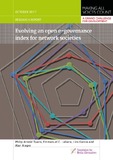| dc.contributor.author | Tuano, Philip Arnold | |
| dc.contributor.author | Lallana, Emmanuel C. | |
| dc.contributor.author | Garcia, Liza | |
| dc.contributor.author | Alegre, Alan | |
| dc.coverage.spatial | Colombia | en |
| dc.coverage.spatial | Indonesia | en |
| dc.coverage.spatial | Pakistan | en |
| dc.coverage.spatial | The Philippines | en |
| dc.coverage.spatial | Uganda | en |
| dc.date.accessioned | 2017-10-24T06:56:18Z | |
| dc.date.available | 2017-10-24T06:56:18Z | |
| dc.date.issued | 2017-10 | |
| dc.identifier.citation | Tuano, P.A; Lallana, E.C.; Garcia, L. and Alegre, A. (2017) Evolving an open e-governance index for network societies, Making All Voices Count Research Report, Brighton: IDS | en |
| dc.identifier.uri | https://opendocs.ids.ac.uk/opendocs/handle/20.500.12413/13303 | |
| dc.description.abstract | The Open e-Governance Index (OeGI) is a framework for measuring open e-governance, developed and tested in four Asian countries in 2012. This report discusses the second phase of OeGI project, which examined whether the framework was applicable to countries outside Asia. It describes the concept
and methodology of the OeGI and provides an overview of its use in Colombia, Indonesia, Pakistan, the Philippines and Uganda. Open e-governance is about how state and non-state actors use information and communications technologies (ICTs) to steer society collectively. The OeGI project defines open e-governance as the presence of:
• meshed e-government: the ability of government to provide integrated, citizencentric
online services
• e-participation channels: the existence of digital channels for public engagement
that complement existing face-to-face or traditional media-led interactions
• digital inclusion: the presence of policies and programmes that support the
public’s wider use of ICTs for development
• civil society use of ICTs: the use of ICTs by non-state actors to promote their
interests in the public sphere
• an open legal and policy ecosystem: the extent of access among the general public
to information and knowledge, and government recognition of the right to free
expression and rights over personal communication, cultural freedom and the
use of local languages.
This framework was used to assess e-governance in five countries. This revealed that while there is progress towards open e-governance, there are dimensions that need to be strengthened. For example, while there is a great demand for online participation among citizens, there are many policies and programmes that governments need to undertake before this can happen. Further, norms for transparency and accountability are critical in ensuring that national ICT systems can be used for political and socio-economic progress. | en |
| dc.description.sponsorship | DFID | en |
| dc.description.sponsorship | Sida | en |
| dc.description.sponsorship | USAID | en |
| dc.description.sponsorship | Omidyar Network | en |
| dc.language.iso | en | en |
| dc.rights | Attribution-NonCommercial-NoDerivs 2.0 UK: England & Wales | * |
| dc.rights.uri | http://www.ids.ac.uk/files/dmfile/IDSOpenDocsStandardTermsOfUse.pdf | en |
| dc.rights.uri | http://creativecommons.org/licenses/by-nc-nd/2.0/uk/ | * |
| dc.subject | Governance | en |
| dc.title | Evolving an open e-governance index for network societies | en |
| rioxxterms.funder | Default funder | en |
| rioxxterms.identifier.project | Default project | en |
| rioxxterms.version | NA | en |
| rioxxterms.funder.project | 9ce4e4dc-26e9-4d78-96e9-15e4dcac0642 | en |

